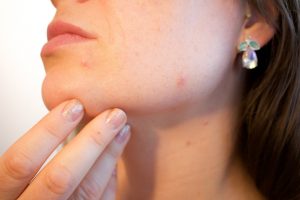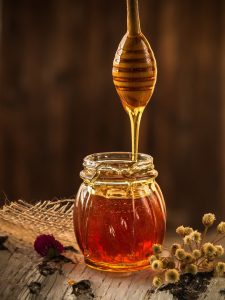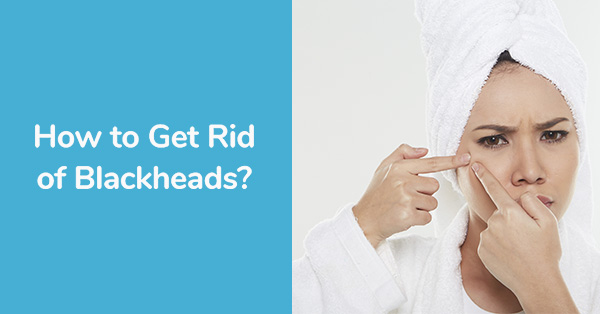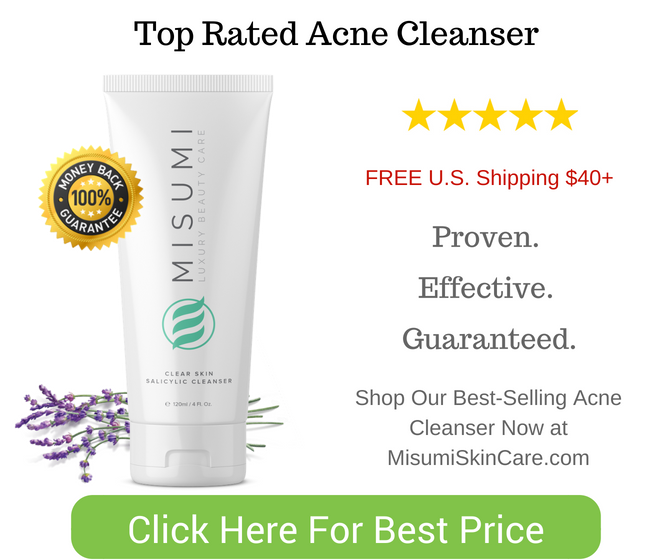We all seem rather embarrassed by the idea of blackheads. It’s an odd state of affairs as it’s not as if these little blemishes are particularly rare. There’s probably not a single person on Earth who hasn’t had some at one time or another.
What is the best approach to treat blackheads? Truth be told, blackheads are amongst the simplest types of blemish to clear off your face. They don’t require a prescription or a specialized treatment to shift them. Instead, a few changes to your skincare routine and the occasional face mask should send them packing. There’s no way to prevent blackheads from coming back (that’s life) but there are a number of ways to get rid of them.
This article will not only provide you with your options for getting rid of blackheads, but we’ll explain what blackheads actually are. This will also cover how they differ from other kinds of acne.
SUMMARY
- Blackheads are a type of acne and are, therefore, inflamed. However, they are the least inflamed kind of acne there is.
- In terms of treatments that are effective against blackheads, Salicylic acid is a widely used acne-fighting ingredient that is effective at reducing blackheads. It does such a good job due to its exfoliating and drying properties, which are especially great for oily skin. Glycolic acid and lactic acid are also good treatments but not as good in our opinion.
- Another effective remedy for clearing the blackheads away is sulfur. This ingredient works by gently drying your skin.
Oily skin
You will find a lot more remedies in this article than dry skin, which is not because of prejudice. It is more down to the fact that a lot of the remedies we have tried out are more suited towards this skin type and it is more common to suffer from blackheads when you have oily skin due to more bacteria clogging up the pores.
Retinoids
These are another option for treating blackheads, though this one is a bit more hit and miss than the previous two. Depending on the person’s skin type they might remove blackheads, or they might result in the skin drying out and flaking; which can lead to more acne.
What do they do?
They help treat blackheads and clogged pores by reducing the stickiness of the cells that clog pores. This increases the speed of skin cell turnover and helps get rid of dead skin cells. Prescription retinoids are a great way at getting the right percentage needed for you. They also help to promote healthy collagen production.
Inflammation, Acne, And Blackheads
As we’ve already mentioned, now is as good a time as any to discuss inflammation and how it relates to blackheads (as well as acne in general).
First of all, whiteheads and pesky blackheads are traditionally categorized as ‘non-inflamed acne ‘. This may seem a bit confusing considering we referred to them as inflamed before but bear with us. This misleading terminology comes from outdated research on acne.
How did they think this?
They thought that pimples and cysts were examples of acne that had become inflamed while whiteheads and blackheads were 100% inflammation-free. Since then it’s been discovered that inflammation is the primary reason for all types of acne.
However, sometimes a term can end up sticking and blackheads and whiteheads are still known as ‘non-inflammatory ‘. There is a certain method to the seeming madness of keeping the name. After all, if inflammation is the root cause of all acne, why are there different types?
Acne varies from the humble blackhead to the hugely unwelcome cyst. The distinction comes from the fact that, while they were caused by inflammation, the inflammation has not gone any further.
If it does keep advancing, then the blackheads and whiteheads advance to the level of papules; the charming mid-way point between a blackhead and a pimple.
Inflammation leads to acne and acne-prone skin
Inflammation of the skin can have any number of causes; one of the most common is stress. No one lives a life free of stress. Extended periods of stress can lead to inflammation. It could also be the result of an external irritant. Skin sensitivity is different for everybody but all skin reacts to irritants, which leads to inflammation.
These irritants can range from an ingredient in a facial wash to a type of material. Or it could even be caused by an infection somewhere in your body (it doesn’t even have to be the same part of the body as to where the inflammation appears).
The human body is a network of different systems running alongside each other and there can be a lot of different ways things can go wrong. When something does go wrong, inflammation causes the skin to swell, sometimes on a microscopic level.
When that happens, the holes in your skin (pores) are forced to contract due to there suddenly being less room for them. When this happens, anything currently in your pores gets stuck there.
This includes the oil your skin naturally produces (called sebum) that keeps it waterproof and lubricated. Oily skin is usually due to excess oil or too much sebum on your skin.
Other detainees include dead skin cells and p. acnes bacteria. Depending on the level of inflammation the pores can close completely; creating a whitehead. If they don’t close all the way, leaving the pore open to the air. And this is where blackheads come from.
Blackheads take on the color they do because the pores aren’t entirely closed. The sebum and dead skin cells are still exposed to the air in a way that whiteheads are not. The exposure to the air will oxidize the sebum, turning it into a dark color.
Enlarged pores
These are common in people with severe sun damage, these can make your blackheads seem larger as they make the openings appear larger and more dilated.
This is due to a decrease in collagen support. Physical exfoliation with skin brushes can help to extract blackheads in this case. Pore strips can also help to be of use here but we would not recommend them.
Know when to wash off!
If you ever feel a stinging or burning feeling with any products you should wash them off immediately with warm soapy water.
Contrary to popular belief this does not mean “it is working”. In fact, it means the opposite. That is actually damaging and you need to take a closer look at the products you are using.
Alpha Hydroxy acids (AHA)
These are used for their exfoliating properties. They help to revitalize skin’s oil production and give a glow to your face after using them.
The most common are glycolic acid and lactic acid. Glycolic and lactic acids are great for exfoliating but should only be done a couple of times a week. If you exfoliate too much you can cause problems with your natural oils.
Salicylic Acid: Breaking Up Blackheads
Salicylic acid is a beta hydroxy acid. A beta-hydroxy acid (BHA) is a chemical exfoliant; they penetrate deep into the pores, and because they are oil-soluble, they get rid of excess oil and dead skin cells that are guilty of clogging pores.
Using beta hydroxy acids like salicylic acid is a good way to get rid of blackheads as long as you use them regularly. They can even help to remove stubborn blackheads but are widely medically reviewed and help speed up cell turnover.
You can get different forms of salicylic acid on the market like Chemical peels, clay masks, pore strips, and chemical exfoliants. Using products like these is how to get rid of blackheads. Although pore strips can remove important natural oils and hair follicles that are helpful.
These products can work on sensitive skin but you need to start with a lower percentage and work your skin tolerance up over time. The lower percentages will still help to unclog pores. Just maybe not as quickly as the higher.
To prevent blackheads we recommend using these products regularly to reduce the number of skin cells turning into dead skin and causing clogged pores. It will also help to unclog pores.
Not only is it an acne treatment and can treat acne very well but also stops you from developing blackheads in the future as well as gently exfoliating your skin.
If you have read this and decided Salicylic Acid is the way forward for you, then check out our Top 3 Salicylic Acid Cleansers.
[ninja_tables id=”3360″]
Aloe Vera
It has skin calming properties and it is great to include in your skin care routine. If you are using alpha hydroxy acids then having something that helps calm your skin is great! It also helps to repair the thin layer of skin that sits on the top of whiteheads.
Honey
Honey is a treatment that works well with all skin tones and types and is hugely effective at reducing new outbreaks of acne.

While it has no impact on existing blackheads, it helps prevent future outbreaks via its powerful anti-inflammatory qualities. By removing the requirements for blackheads to form in the first place, this powerful natural agent can help keep your skin unblemished.
In some respects, this makes honey a better choice than lemon juice. Like we keep saying; preventing acne outbreaks is far better than fighting them once they arrive.
If you’ve decided to make use of honey, it can be applied directly to the skin without the need for other ingredients. As with lemon juice, make sure you’re using pure honey.
Does type matter?
There is a certain amount of debate about whether the type of honey has any impact. On the one hand, some studies have shown that Manuka honey is the best choice for treating acne.
On the other hand, different studies have found no significance between different types of honey with regards to their acne-fighting benefits. In the absence of any clear consensus, we advise letting your heart decide. And by ‘heart’ we mean ‘wallet’.
With no clear ‘best’ honey to choose, you might as well use whichever one is lightest on your budget. The only other factor to keep in mind is making sure the honey you’re using has no added ingredients such as fructose or water as these will reduce the benefits of the honey.
How to use it?
Apply the honey to your skin and let it sit for twenty minutes to one hour. Once done, rinse off with cool water and pat yourself dry with a towel.
Does eating it work?
Some studies also suggest that ingesting honey can also help fight inflammation. If smearing honey over your face is too messy for your liking (or if you just want to eat some honey) you can try eating a spoonful of honey a day. Alternatively, you could put that spoonful in your tea. Either way, this could also help fight inflammation.
For more information visit our home remedies page.
Coverage
Obviously, it won’t be possible to get rid of all of your blackheads overnight. Therefore, you may wish to cover them. We recommend using a single layer of foundation or concealer that matches your skin tone. And remember to wash that skin brush of yours!
CONCLUSION
We’d like to close out by streamlining your focus into a central idea that you should put at the core of your skincare routine. Whatever type of skin you have, no matter how much money you have in your skincare budget, your main goal is to avoid irritating your skin-especially if you have inflammatory acne.
Skincare is a very deep subject and even an article just on blackheads has this much information. But the flood of skincare options is different ways to reach the same goal; preventing irritation of your skin. Irritation leads directly to inflammation which, (one last time), is the core cause of all types of acne.
The art of skincare ultimately breaks down into two stages. The first stage is to tackle any irritation or inflammation you currently have and return your skin to the healthiest state possible.
Once you’ve achieved the blackhead-free, unblemished skin you’ve always wanted, your priority shifts to maintaining this state of affairs. So, make use of the information in this article.





